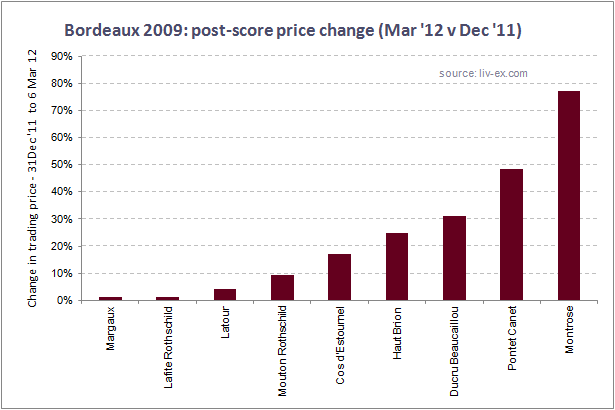My Article: Post First Growth 2009 Prices After 100-Point Scores
 Just about everyone in the Hong Kong wine world – and everywhere else on the globe – has been talking about the sales of 2009 Bordeaux since the release of scores on the market – particularly Robert Parker’s and mine. As I have written, 2009 is a vintage of a lifetime. The quality is amazing.
Just about everyone in the Hong Kong wine world – and everywhere else on the globe – has been talking about the sales of 2009 Bordeaux since the release of scores on the market – particularly Robert Parker’s and mine. As I have written, 2009 is a vintage of a lifetime. The quality is amazing.
I “only” gave nine perfect, 100-point scores, while Bob gushed with more than double that at 19. I think he went overboard. Some of his wines rated 100 points seem exaggerated, while others on the 98 and 99 level should be perfect wines. But that’s part of wine criticism. We have both been professionally rating Bordeaux since the early 1980s. So, we have our likes and dislikes.
However, I was curious what sort of impact our 100 points, and in some cases 200 points, had on the market – in particular, prices. I asked London-based fine wine exchange Liv-ex to crunch some numbers, and it shows that a lot of the talk of prices jumping after the scores is hype.
The percent increases in trading prices for the majority of first growths has been miniscule with Margaux and Lafite barely increasing in price – only one percent. Latour rose four percent and Mouton nine percent. Haut-Brion was the big performer, rising 25 percent.
I think the dramatic increase in HB’s price is more due to the fact that it was one of the cheapest first growths before the scores came out, rather than receiving the equivalent of 200 points – 100 from me and 100 from Bob. Investors in 2009 Bordeaux saw an upside, so they bought.
The huge increases have been with Pontet-Canet and Montrose. This is totally point-driven price appreciation. The fact is that even with respective price increases of 48 percent and 77 percent, they are trading at almost two or three times less the price of the first growths. In other words, they are a deal for 100-point wines.
My hunch is that prices for 2009 Bordeaux will come down, as many of the top wines did not increase after the scores. Even those wines with big increases will show very little appreciation for the near future.
A wine collector who just arrived in my office in Hong Kong as I finished this wasn’t worried: “I am not going to sell the wines anyways right now. You need a longtime view.”
I couldn’t have said it better myself.